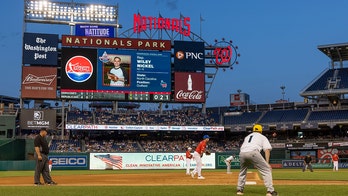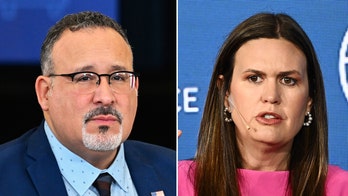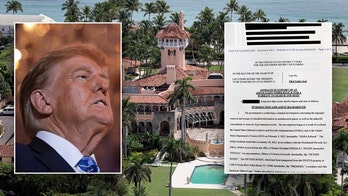Who's pulling the strings in tug of war over Syria?
Assad reportedly accepts Russian proposal to put chemical weapons under international control
Syria's foreign minister said Tuesday that President Bashar Assad has accepted a Russian proposal to turn over control of Syria's chemical weapons, potentially opening the door to defusing a stand-off with the United States as President Obama indicates he's willing to give the "diplomatic track" a try.
According to the Associated Press, Syrian Foreign Minister Walid al-Moallem said Tuesday after meeting with the Russian Parliament speaker that his government's officials quickly agreed to the Russian initiative to "derail the U.S. aggression."
At the same time, conventional weapons were still being used to pound Syria's people, demonstrating that a settlement to the bloody civil war could still be a long way off. The AP released authenticated images on Tuesday showing smoke rising from buildings in a district of Damascus after heavy shelling.
The developments could nevertheless dramatically alter the nature of the national address Obama plans to give on Tuesday night. He had been planning to make the case for a military strike, but in the last 24 hours has eased off that call amid budding international negotiations.
Senate Majority Leader Harry Reid also postponed a test vote originally teed up for Wednesday on whether to authorize the use of force. Reid cited "international discussions" in his decision.
Russia's Foreign Minister Sergey Lavrov said that Russia is now working with Syria to prepare a detailed plan of action, which will be presented shortly.
U.S. officials are approaching the proposal with guarded optimism. They cite concerns about Syria and Russia stalling, and about the ability of the international community to verify the security of Syria's chemical weapons.
Sen. John McCain, R-Ariz., one of the biggest supporters of U.S. military action in Syria, told Sky News that the plan to have Syria turn over chemical weapons is an "option" that should be pursued, though he's skeptical. He said the "first test" would be for U.N. monitors to go to Syria to secure the weapons.
Members of the Syrian opposition reportedly were skeptical of any Assad pledges to give up his chemical weapons stockpile.
But Obama, in an interview with Fox News on Monday, opened the door to pursuing that option.
"We will pursue this diplomatic track," Obama told Fox News. "I fervently hope that this can be resolved in a non-military way."
The president, while saying his advisers would "run to ground" that proposal, indicated he still wants Congress to debate a resolution to authorize a strike against Syria. "I think it is important for us not to let the pedal off the metal when it comes to making sure they understand we mean what we say," Obama said.
But the president's decision to pursue the diplomatic track is a departure from his decision more than a week ago to pursue a military strike. And it could bring the temperature down a notch in the ongoing stand-off between his administration and the Assad government.
The president's comments come after a proposal to have the Syrian government relinquish control of its stockpile quickly caught fire in the international community and in Washington.
Secretary of State John Kerry touched off the discussion with an off-hand remark that Syria could only avert military action if it turned over its weapons within a week.
Kerry and his aides afterward claimed the secretary was merely making a "rhetorical" point. But Russia's foreign minister formally proposed the idea to Syria, and the Assad government said it welcomed the plan.
As the United Nations secretary-general and several U.S. allies gravitated toward the proposal, the Obama administration conceded that it would seriously consider it.
Obama went further in his interview with Fox News.
"I welcome the possibility of the development," he said. "We should explore and exhaust all avenues of diplomatic resolution to this."
He said the U.S. should be able to get a "fairly rapid sense" of how serious the proposal is. "We are going to be immediately talking to the Russians and looking for some actual language they might be proposing," he said.
But Obama said it's important to "keep the pressure on." Roughly quoting the late President Ronald Reagan, he said: "It's not enough just to trust. I think we're going to have to verify."
The president said the idea of negotiating this kind of solution is "something that is not new."
The president also brushed off comments made earlier by Assad in which he threatened that there could be "repercussions" if the U.S. attacks.
Assad's military capabilities are "not significant relative to the U.S. military," Obama said.
The interview comes as Obama prepares to address the nation from the White House on Tuesday night -- as national polling shows Americans are increasingly opposed to U.S. military action in that country's civil war.
A new Fox News Poll shows that public disapproval of Obama's handling of Syria has jumped from 40 percent to 60 percent. It also found just 36 percent favor using force to punish Syria for using chemical weapons; 61 percent oppose taking that step.
"Right now, the American people are not persuaded," Obama acknowledged. "Right now, members of Congress who are just getting back still have questions."
With the proposal so unpopular in the polls, Obama was having a difficult time selling the idea of a strike to Congress. A Senate test vote could still be held later this week, but the White House is struggling to corral the 60 votes that likely will be necessary to advance it. Senate Republican Leader Mitch McConnell was the latest to come out against a strike on Tuesday.
The administration faces an even tougher time in the Republican-controlled House.
Obama stressed in the interview that the situation in Syria is "difficult," but the U.S. was looking at taking action because chemical weapons -- which the administration accuses the Assad regime of using -- are "indiscriminate." But he also said he understands Americans' skepticism over U.S. involvement.
"The American people are right not to want to have us entangled in a sectarian civil war inside of Syria," he said.
The Associated Press contributed to this report.





